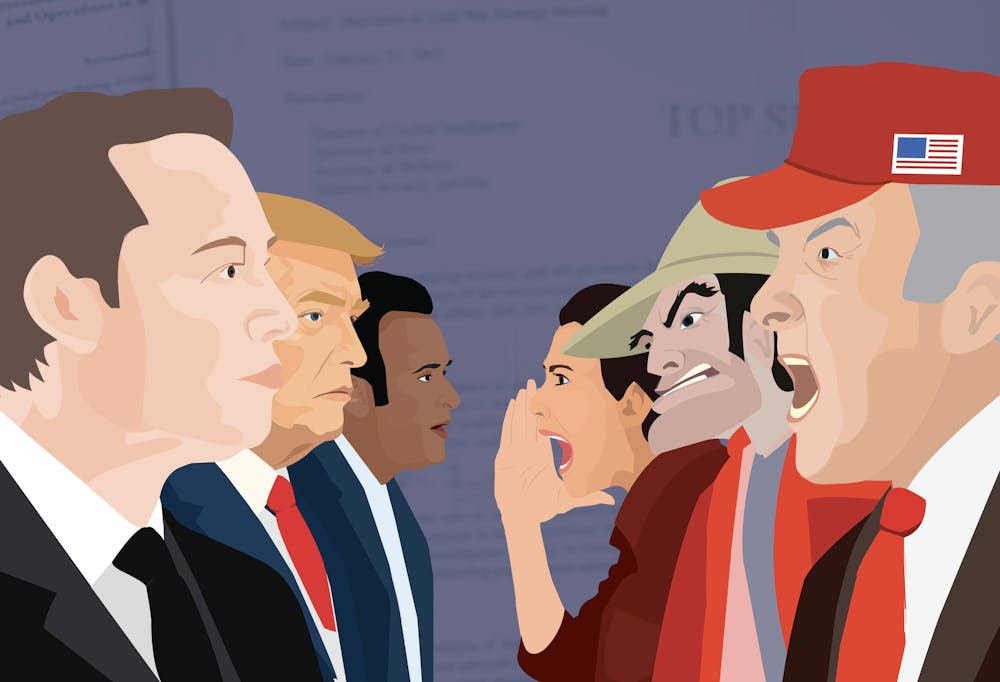The federal government has always had to deal with the struggle between businesses and the working class. Individuals in control of corporations and payrolls often being at odds with their employees is not a concept unique to this country or timeframe, but it seems to be especially prevalent in the U.S. economy, where politicians have long announced their candidacies from corner offices.
But these interests have long been faceless. Or, at least, none have had a face so clear as that of Elon Musk. In the past year, Musk aided Donald Trump’s presidential victory, particularly through his control of X, systematically promoting right-wing and pro-MAGA content after previously promising to continue political neutrality on the site. This proved to gain the CEO a spot leading the newly created Department of Government Efficiency alongside Vivek Ramaswamy and, perhaps more importantly, the ear of President-elect Trump.
Musk, the CEO of Tesla and SpaceX, stands to benefit greatly when Trump takes office, but not just through his promised government position. H-1B, a visa program for skilled nonimmigrant workers, was restricted by the Departments of Labor and Homeland Security in 2020 during Trump’s first term, but last month Musk and Ramaswamy helped reignite debate in favor of the scheme, ostensibly because it delivers a higher level of skill to the tech industry. Both figures criticized what Ramaswamy called an American culture of mediocrity.
Of course, this garnered a heated response from many on the right, using it as a chance to direct hate toward Indian and Chinese people, two of the largest ethnicities receiving the visa. As is often the case in conservative rifts, both sides are wrong.
H-1B is so strongly supported by tech executives like Musk because it allows for what is essentially the importation of cheap human labor. The average yearly salary in India is around the equivalent of $3,000, making the same, higher paying job in the United States far more appealing. Because overseas workers can make far more money with a U.S. company, they often take a wage significantly less than United States-born workers would. This helps businesses improve their profit margins at the cost of skilled Americans.
I hate to agree, even slightly, with those on the alt-right, but this is not in the best interests of the United States. If there is a problem with the engineering and tech cultures in this country, that should be solved in-house. A “permanent shortage,” as Musk says, should be combatted with efforts not to recruit talent from overseas, but to create it within the existing populace. Silicon Valley has the money to do this, no doubt, but the real issue lies not with the working or educational culture, but with the desire of those who utilize H-1B to increase profits.
According to the Economic Policy Institute, there were 85,000 U.S. workers laid off from 2022-23 by the top 30 companies which use the H-1B program. In that same timeframe, 34,000 guest workers were hired, largely at lower wages. It is simply cheaper for tech companies to exploit foreign labor. For companies like Musk’s Tesla, which laid off thousands of workers last year, H-1B is a tool to throw away U.S. workers so its shareholders can receive a larger bonus.
Foreign workers are an important part of the U.S. economy, but they are only recognized when they benefit those in power. H-1B has promised, if used, what it was meant to be used for: a temporary stopgap when skilled positions are not able to be filled. This is simply a continuation of the anti-worker policies supported by conservative politicians in recent years.
At the behest of Musk and Ramaswamy, the incoming administration will support this program for all the wrong reasons — and the U.S. public will be thrown by the wayside. As we begin Trump’s second term, and policies benefiting top executives at the expense of their employees become more common, the public and media must be wary of our country’s continued merging of the public and private sectors.




